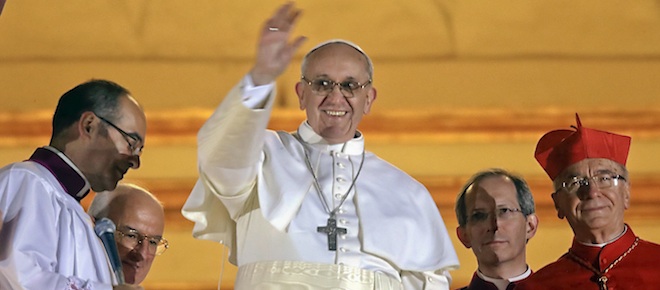Pope Francis: New World pope signals Third World issues will dominate Church
Maclean’s senior writer Brian Bethune reports from the Vatican
Pope Francis waves to the crowd from the central balcony of St. Peter’s Basilica at the Vatican, Wednesday, March 13, 2013. Cardinal Jorge Bergoglio, who chose the name of Francis is the 266th pontiff of the Roman Catholic Church. (AP Photo/Gregorio Borgia)
Share

For 10 rainy, cold hours in Rome, the Sistine seagull was the star of the show. He or she or the three different birds who repeatedly settled on the chimney of the Sistine Chapel, always at moments when powerful clouds of either white or black smoke were expected, woke up a cheerful but frozen crowd that neared 100,000 by then. And when the new pope—an austere Argentinian Jesuit—took the name Francis, after one of the most beloved figures in Catholic history, the patron saint of animals, famous for charming the birds into his hands, the gull was widely seen—at a minimum—as a favourable omen.
The morning crowd, on a working day, was smaller, making the clergy among them more noticeable. There were Capuchin friars and Franciscan monks—spectacularly happy by night’s end—nuns both numerous and, more startling to North American eyes, young—Polish seminarians and two Scottish priests, who had come on a three-day holiday. (Conclave fans, they’d done the same in 2005 when Benedict XVI was elected and weren’t, they laughed, just making up for their cardinal’s absence.) But flags and palpable enthusiasm were not in plentiful supply.
By the afternoon, though, even as the rain intensified, the feeling was entirely different. The front rows in St Peter’s square were taken up Brazilians, Mexicans, Argentinians and Filipinos, singing, chanting “Vive el papa,” and waving flags, as were citizens of everywhere from Malta to Romania, including someone with an Israeli flag. None of them wanted to jinx their cardinals by discussing their hopes with a journalist, though one middle-aged Argentinian couple did mention their long-shot papabile, Leonardo Sandri. Slowly the Romans, who increased in numbers as the day wore on, joined in the fun, and their flags began to dominate. The rain and cold, however, was beating down even the Filipinos—moments of gull action excepted—when the white smoke billowed out a little past 7 p.m.
It was as though a shot of electricity went through everyone. A moment of hesitation when the colour of the smoke was unclear, a scream when there was no mistaking its whiteness, and the bells began to peal. An hour later, the lights went on behind the basilica balcony, and a cardinal appeared to announce Pope Francis. Almost everyone in the crowd caught that, but few heard his previous names, Cardinal Jorge Mario Bergoglio. Then the buzz among the Italian journalists began—Argentino, Argentino!—only to be drowned out by the ever-cheerful Filipinos’ “Papa Francisco, Papa Francisco!”
The mild-mannered, fatherly looking 76-year-old finally appeared on the balcony, he asked 100,000 people for silence—and instantly got it—with: “And now I would like to give the blessing, but first I want to ask you a favour. Before the bishop blesses the people I ask that you would pray to the Lord to bless me – the prayer of the people for their Bishop. Let us say this prayer – your prayer for me – in silence.”
Mild-mannered Francis may be, but he is the first Jesuit in the 450-year history of his order—one that had several moments of antagonism with the papacy—to be elected pope. He is an archetypical Southern catholic prelate in his traditionalist views on sexual and social morality, and a strong critic of global capitalism, declaring at a bishops’ conference in 2007 that Latin America was a region of “scandalous inequality,” where economic growth has “reduced misery the least—the unjust distribution of goods persists, creating a situation of social sin that cries out to heaven.” One of his first acts as archbishop of Buenos Aries was to get rid of his chauffeur-driven limo and take public transportation. In choosing Francis as the first New World pope—the first from outside Europe in 1,300 years—the cardinals have signalled, just as Bergoglio did with his choice of papal name, that Third World issues of poverty and social injustice would dominate the Church.